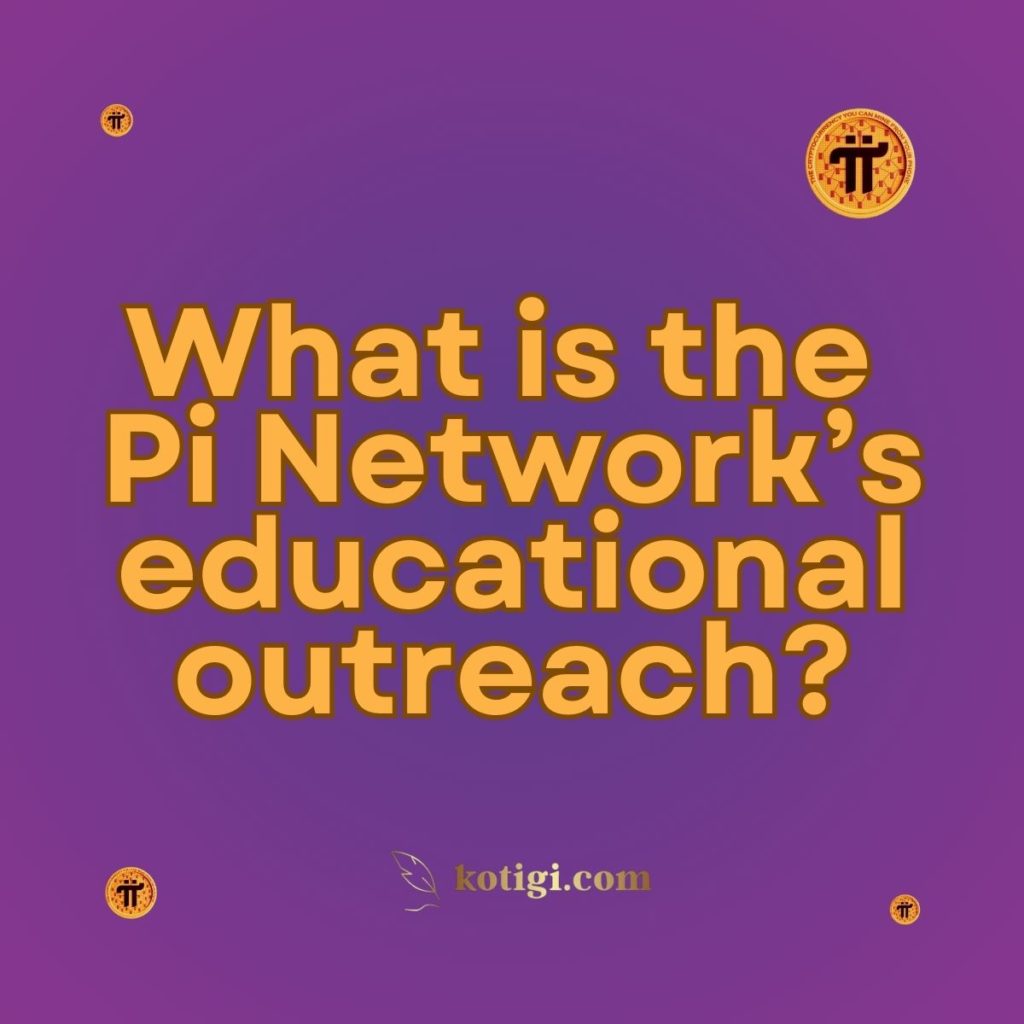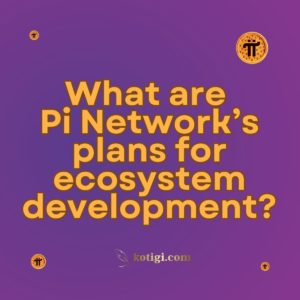
What is the Pi Network’s educational outreach?
The Pi Network’s educational outreach focuses on demystifying cryptocurrency and blockchain technology for its users. Through online courses, webinars, partnerships with educational institutions, and community-driven educational programs, the Pi Network aims to empower individuals with the knowledge and skills needed to engage effectively in the cryptocurrency space.
Introduction
The emergence of blockchain technology and cryptocurrencies has revolutionized how we perceive value, transactions, and data security. Among the various projects that have gained significant traction in this domain, the Pi Network stands out for its unique approach to user engagement and education. By prioritizing educational outreach, the Pi Network aims to empower its community, equipping them with the knowledge and skills necessary to navigate the evolving landscape of digital currencies. This post delves into the various facets of the Pi Network’s educational outreach, exploring its objectives, methods, and impact on its user base.
Key Components of Pi Network’s Educational Outreach
| Component | Description | Benefits |
|---|---|---|
| Online Courses | Comprehensive courses on cryptocurrency fundamentals, blockchain technology, and practical applications. | – Flexible learning pace – Interactive content with quizzes – Tailored for varying skill levels |
| Webinars | Live sessions with industry experts discussing trends, security, and user experiences in the Pi Network ecosystem. | – Direct interaction with experts – Real-time Q&A sessions – Insights into current and relevant topics |
| Partnerships | Collaborations with educational institutions for curriculum development, guest lectures, and joint research efforts. | – Broader resource availability – Enhanced credibility – Academic insights into cryptocurrency topics |
| Community-Driven Programs | Initiatives led by community members, such as study groups, workshops, and peer-to-peer mentoring. | – Empowers user-led learning – Fosters community engagement – Addresses specific local needs |
| Educational Materials | A variety of resources including guides, infographics, videos, and tutorials covering key concepts and skills. | – Diverse formats for different learning styles – Simplifies complex ideas – Promotes knowledge retention |
| Feedback Mechanisms | Tools for gathering user input through surveys and assessments to improve educational content and programs. | – Ensures relevance and effectiveness – Encourages community involvement – Facilitates continual improvement |
| User Engagement Metrics | Evaluation of participation rates and effectiveness through knowledge retention assessments and real-world applications. | – Measures educational impact – Identifies areas for improvement – Supports community growth and retention |
Understanding the Importance of Educational Outreach
The Role of Education in Cryptocurrency
Education plays a crucial role in the cryptocurrency sector, particularly as it is often perceived as complex and daunting. With a vast array of technical jargon, intricate concepts, and evolving regulations, many individuals are hesitant to engage with cryptocurrencies. Educational outreach initiatives are essential in simplifying these complexities, fostering understanding, and promoting active participation in the ecosystem. By equipping users with foundational knowledge about blockchain technology, digital wallets, mining, and trading, the Pi Network can cultivate a more informed community.
Bridging the Knowledge Gap
A significant barrier to entry for many potential users is the knowledge gap that exists within the cryptocurrency space. Educational outreach serves to bridge this gap by providing resources, training, and support tailored to individuals with varying levels of expertise. The Pi Network’s commitment to education ensures that both novices and experienced users can access the information they need to make informed decisions regarding their participation in the network and the broader cryptocurrency market.
Fostering a Supportive Community
The Pi Network’s educational outreach initiatives also foster a sense of community among users. By creating platforms for discussion, collaboration, and shared learning, the network encourages individuals to support one another in their educational journeys. This sense of community is vital for promoting user retention and engagement, as individuals are more likely to remain active in a supportive environment.
Key Components of the Pi Network’s Educational Outreach
Online Courses and Learning Resources
One of the primary methods the Pi Network employs in its educational outreach is the provision of online courses and learning resources. These courses cover a range of topics, from the basics of blockchain technology to advanced trading strategies. By offering accessible and comprehensive educational materials, the Pi Network ensures that users can learn at their own pace and deepen their understanding of the cryptocurrency landscape.
Types of Courses Offered
The Pi Network offers various courses tailored to meet the needs of its diverse user base. These courses may include:
- Introduction to Cryptocurrency: A foundational course covering the basics of digital currencies, including what they are, how they work, and their potential applications.
- Blockchain Technology 101: An overview of blockchain technology, exploring its underlying principles, benefits, and real-world use cases.
- Mining and Network Participation: A course focused on the mining process within the Pi Network, teaching users how to mine Pi effectively and understand the associated concepts.
- Trading Strategies and Market Analysis: An advanced course that delves into trading strategies, market analysis techniques, and risk management practices.
Accessibility and User Engagement
The online courses offered by the Pi Network are designed to be easily accessible to all users. By utilizing a user-friendly learning platform, participants can engage with the content through interactive modules, quizzes, and discussions. This format not only enhances comprehension but also encourages active participation and knowledge retention.
Webinars and Live Q&A Sessions
In addition to online courses, the Pi Network regularly hosts webinars and live Q&A sessions featuring experts from the cryptocurrency and blockchain sectors. These events allow users to interact directly with knowledgeable individuals, ask questions, and gain insights into various topics related to the Pi Network and the broader cryptocurrency ecosystem.
Topics Covered in Webinars
Webinars cover a diverse range of subjects, including:
- Current Trends in Cryptocurrency: Discussions on the latest developments in the crypto market, regulatory changes, and technological advancements.
- Navigating Security in Cryptocurrency: Tips and best practices for ensuring the security of digital assets, wallets, and personal information.
- Community Success Stories: Highlighting successful Pi Network users and their experiences, providing inspiration and motivation for others.
Enhancing Community Interaction
Webinars and live sessions create an interactive environment that fosters community engagement. Users can share their experiences, ask questions, and learn from one another. This collaborative learning approach strengthens the Pi Network community and encourages users to remain actively involved in their educational pursuits.
Partnerships with Educational Institutions
The Pi Network recognizes the value of collaboration in enhancing its educational outreach efforts. By partnering with educational institutions, the network can leverage existing resources, expertise, and infrastructure to expand its educational initiatives.
Collaborations with Universities and Colleges
The Pi Network seeks to establish partnerships with universities and colleges to develop joint educational programs. These collaborations may include:
- Curriculum Development: Working with academic institutions to integrate cryptocurrency and blockchain-related courses into their curricula.
- Guest Lectures and Workshops: Inviting industry experts to conduct guest lectures and workshops for students interested in blockchain technology and cryptocurrencies.
- Research Opportunities: Collaborating on research projects that explore the implications of blockchain technology in various sectors, contributing to the academic understanding of the field.
Community-Driven Educational Programs
Another significant aspect of the Pi Network’s educational outreach is its focus on community-driven programs. By empowering users to take an active role in educating themselves and others, the network can create a sustainable educational ecosystem.
Peer-to-Peer Learning Initiatives
The Pi Network encourages users to engage in peer-to-peer learning by sharing knowledge, resources, and experiences. This collaborative approach fosters a sense of ownership and investment in the educational process. Users can participate in study groups, discussion forums, and knowledge-sharing platforms, creating a rich environment for learning.
Localized Educational Events
The Pi Network also supports localized educational events organized by community members. These events can include workshops, meetups, and seminars focused on cryptocurrency and blockchain topics. By facilitating these grassroots initiatives, the network can address the unique needs and interests of local communities.
Educational Materials and Resources
The Pi Network provides various educational materials and resources to support its outreach efforts. These materials are designed to cater to different learning styles and preferences, ensuring that users can access information in formats that resonate with them.
Written Guides and Tutorials
The network offers comprehensive written guides and tutorials covering various topics related to cryptocurrency and the Pi Network. These materials may include step-by-step instructions, FAQs, and best practice recommendations.
Visual Learning Resources
In addition to written content, the Pi Network incorporates visual learning resources such as infographics, videos, and presentations. These resources are designed to simplify complex concepts and enhance user comprehension.
Feedback and Continuous Improvement
The Pi Network values user feedback and continually seeks to improve its educational outreach initiatives. By actively soliciting input from users, the network can identify areas for enhancement and adapt its offerings to better meet the community’s needs.
User Surveys and Feedback Mechanisms
The network conducts regular surveys and feedback sessions to gather insights from users regarding their educational experiences. This feedback informs the development of new courses, webinars, and resources, ensuring that the educational outreach remains relevant and effective.
Adapting to Industry Changes
As the cryptocurrency landscape evolves, the Pi Network is committed to staying updated on industry trends and changes. This adaptability allows the network to modify its educational materials and initiatives to reflect current developments, ensuring that users receive accurate and timely information.
Measuring the Impact of Educational Outreach
User Engagement Metrics
One way to assess the impact of the Pi Network’s educational outreach is by analyzing user engagement metrics. This includes tracking participation rates in online courses, webinars, and community events. High levels of engagement indicate that users find value in the educational resources provided.
Knowledge Retention and Application
Another crucial metric for measuring impact is knowledge retention and application. The network can conduct assessments or quizzes to gauge users’ understanding of key concepts taught in courses. Additionally, tracking how users apply their knowledge in real-world scenarios can provide insights into the effectiveness of the educational outreach.
Community Growth and Retention
The growth and retention of the Pi Network community are also indicative of the success of educational outreach efforts. A well-informed and engaged user base is more likely to remain active and contribute positively to the network, fostering a vibrant ecosystem.
Conclusion
The Pi Network’s educational outreach initiatives play a pivotal role in fostering user engagement, understanding, and participation in the cryptocurrency space. By prioritizing education, the network empowers individuals with the knowledge and skills needed to navigate the complexities of blockchain technology and digital currencies. Through online courses, webinars, partnerships with educational institutions, and community-driven programs, the Pi Network creates a supportive learning environment that encourages collaboration and growth. As the cryptocurrency landscape continues to evolve, the Pi Network’s commitment to education will be essential in ensuring that its community remains informed and engaged.
Key Takeaways
- The Pi Network’s educational outreach focuses on demystifying cryptocurrency and blockchain technology for users.
- Various educational resources, including online courses, webinars, and written guides, are offered to support users at different learning levels.
- Partnerships with educational institutions enhance the reach and effectiveness of the network’s educational initiatives.
- Community-driven programs and peer-to-peer learning foster collaboration and shared knowledge among users.
- Continuous feedback and adaptation to industry changes ensure that the educational outreach remains relevant and impactful.





